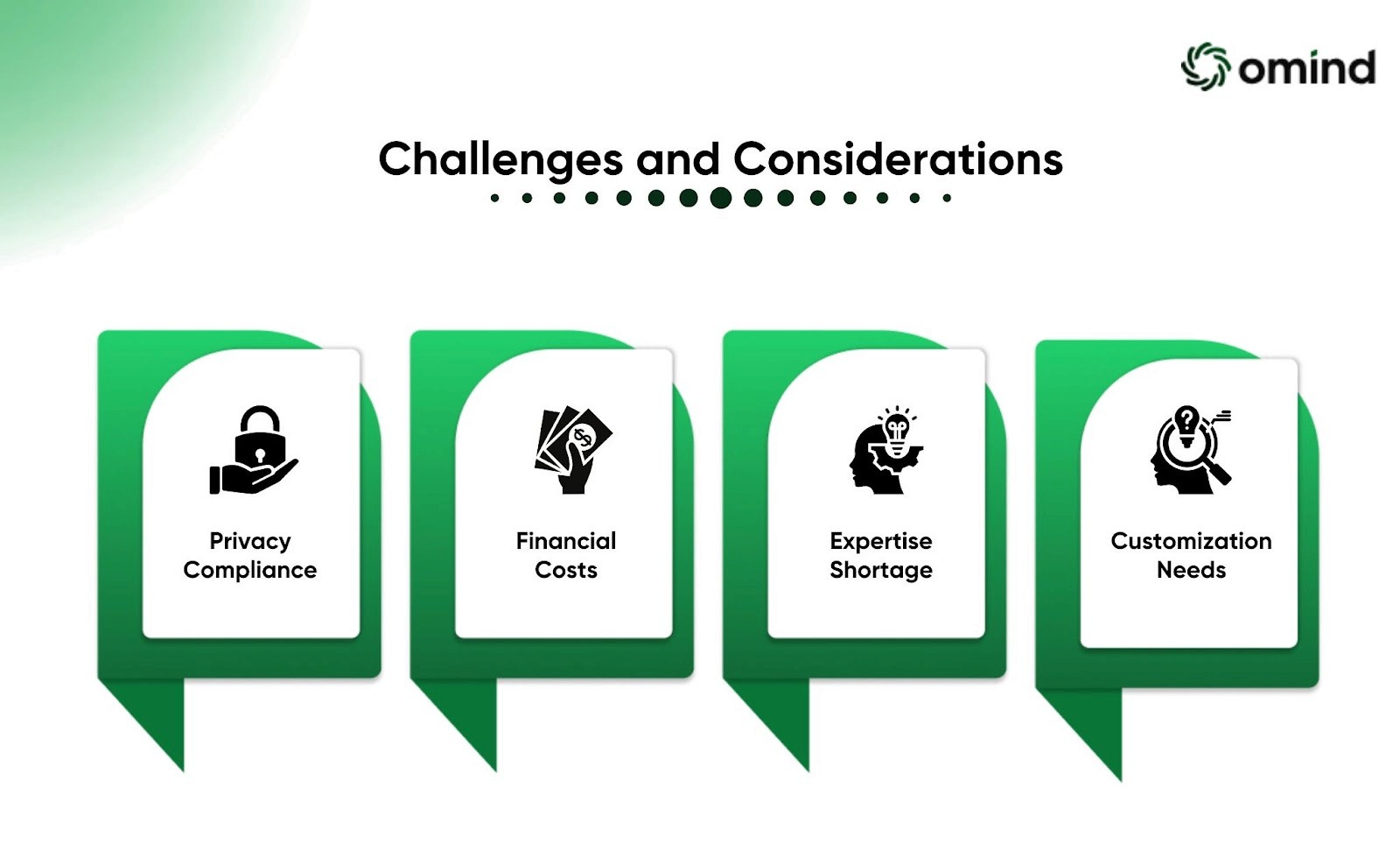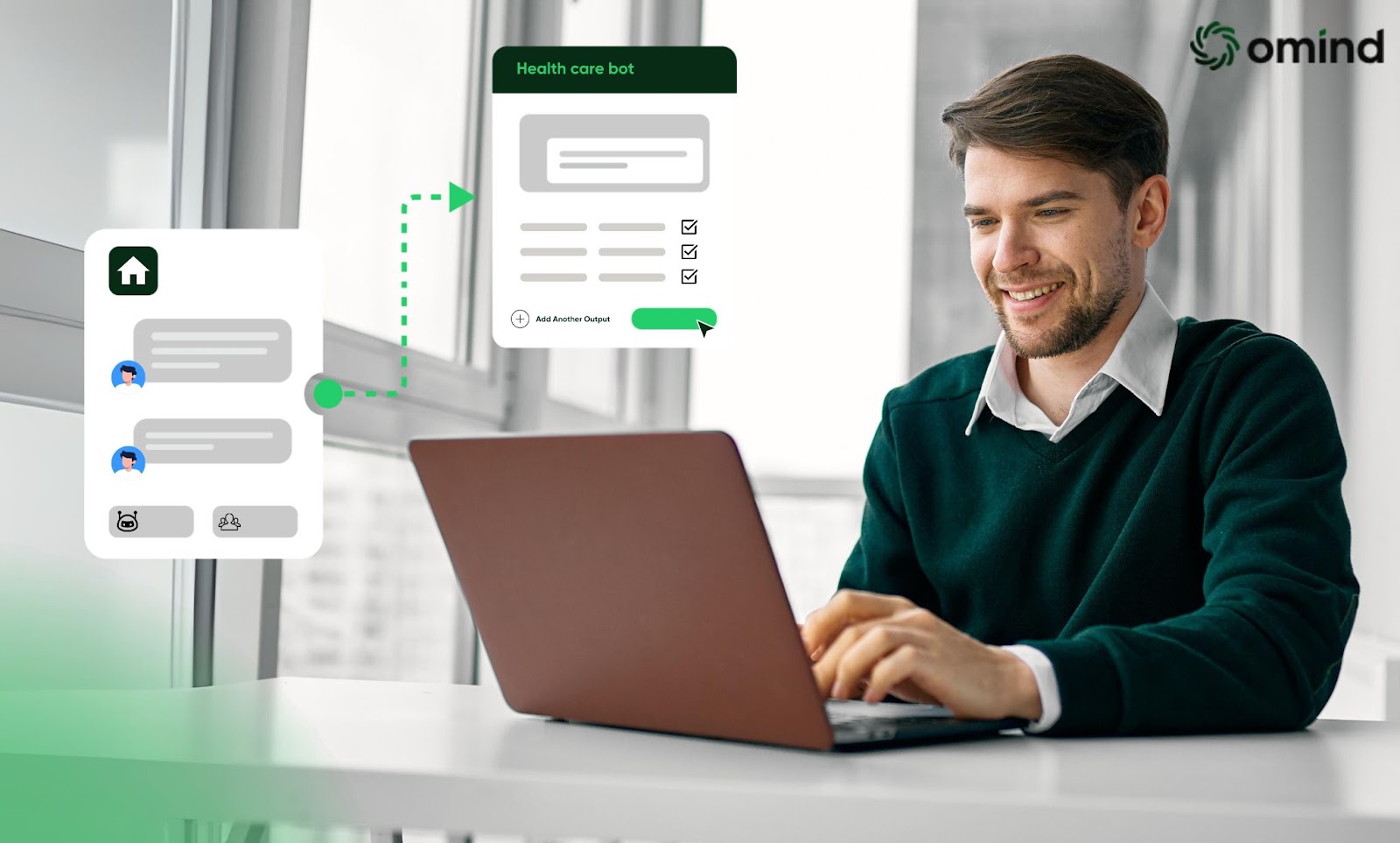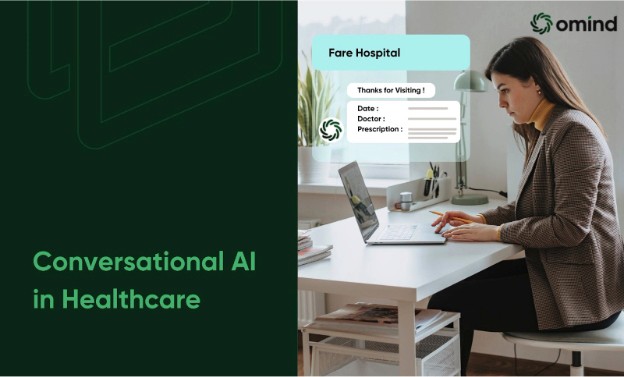Jul 5, 2024
BLOG • 4 MIN READ
Key Use Cases of Conversational AI in Healthcare
Travel, Hospitality & Transport
The innovation has greatly impacted various sectors, and the arrival of conversational AI boosted this opportunity. A study by Grand View Research in 2022 says that this sector will grow 26.6% from 2023 to 2030. We see this growth in health, which changes how hospitals deal with their patients. Conversational AI in healthcare improves patient experiences and efficiency within the healthcare system. With AI, basic tasks are automated, giving the staff more time to care for their patients.
The effect of the COVID-19 pandemic reminded us of strong and adaptable technologies to handle unexpected challenges. At that time, conversational AI helped some hospitals manage patient inquiries, assess symptoms, and provide timely information during the crisis. They are useful in healthcare to optimize routine processes, reduce wait times, and enhance contact between patients and hospitals. It also helps to mitigate the workload for the hospital staff on daily tasks.
If you are in healthcare and are considering using technology, this article is for you. Stay with us to learn how this innovation changes how we handle patients.
The Rise of Conversational AI in Healthcare

AI technology is revolutionizing healthcare by offering a more natural and interactive way for patients and providers to connect. But how is it different from chatbots? The following section will explain.
The Power of NLP and Adaptability
While traditional chatbots often provide pre-programmed responses, more advanced conversational AI solutions in healthcare use Natural Language Processing (NLP) to understand human language better. It is important to have a proper and contextual conversation where the AI can adapt to the user's unique needs and questions. A unified customer experience is what any field expects and this is possible by using the power of AI, especially in healthcare.
Tailoring the Experience
A person's health needs are unique from those of others. Using conversational AI, a healthcare system can be customized to a patient's medical history, giving targeted information and support. It's an ally that tells patients about upcoming appointments or helps them manage their medications based on their specific prescriptions.
Integration with Healthcare Systems
Conversational AI integration with Electronic Health Records (EHR) and Customer Relationship Management (CRM) tools can access a wealth of patient data. This guarantees the AI assistant provides the most relevant data for every user, enabling more accurate and tailored responses. Imagine integrating such advanced AI capabilities into your existing systems; with providers like Omind, the process becomes streamlined and easier to manage.
Growth and Adoption in Healthcare
Healthcare providers are increasingly adopting conversational AI and expect its usage to continue growing in the coming years. This innovation is useful for both patients and providers, simplifying procedures, improving communication, and, finally, improving the overall healthcare experience.
Core Use Cases of Conversational AI in Healthcare
Now, you can learn how this system is changing healthcare, offering many benefits for patients and providers. See some of the core use cases that are changing the way we experience healthcare:
Appointment Scheduling: Usually, patients call the hospital front office to schedule a visit. Conversational AI simplifies this, allowing patients to make appointments 24/7 through a user-friendly chat interface. It is convenient, lowers the administrative burden on healthcare staff, and provides a unified experience for patients and workers.
Patient Care Management: There was a time when staff dug through all the papers to find information about their patients. Now, AI can simplify access to the patient's medical data. Staff and patients can view upcoming appointments, prescription details, test results, and other health data. This will improve patient engagement and empower people to participate more actively in their health management. Omind's conversational AI makes accessing and managing patient data simple and efficient, leading to higher patient satisfaction and better care quality.
Health and Medication Management: Medication schedules are important for successful treatment, and the technology may provide personalized help. A virtual assistant can remind about medication, offer dosage instructions, and even answer questions about possible side effects.
Symptom Checking and Medical Screening: Are you not feeling well and want to know why? At first, a patient can use conversational AI to assist. Using AI-powered symptom checkers, you can receive initial assessments and advice on self-care or seek professional medical attention. Individuals need to make choices about their health, and healthcare providers prioritize care for those who need it most.
Patient Support: Sometimes, managing healthcare accounts and complex medical systems can be difficult. Conversational AI can offer great help by offering a user-friendly chat interface, gaining access to insurance information, submitting billing questions, or even requesting prescription refills—all without the need for lengthy phone calls or visits to administrative offices.
Mental Health Support and Counseling: Conversational AI systems can be valuable for mental health support. AI-powered chatbots can offer empathetic responses, provide coping techniques, and connect users with mental health professionals when necessary. This is beneficial for individuals who are hesitating to seek traditional therapy due to stigma or accessibility problems.
Automating Administrative Tasks: Conversational AI is a good option if your staff spends a lot of time on administrative tasks. It can automate many repetitive tasks, such as appointment confirmations, pre-screening surveys, and insurance verification. This frees healthcare staff to focus on what is important—providing high-quality patient care. By integrating Omind's seamless AI solutions, your healthcare practice can reduce the time spent on routine administrative tasks, allowing staff to focus on patient care.
Public Health Information: Conversational AI greatly helps people during public health crises in healthcare. Chatbots answer public questions about symptoms, preventative measures, and available resources. This technology ensures that the public has access to accurate information.
Patient Reminders: All people do not remember their consultation and other important health matters. Using conversational AI in healthcare can remind patients about upcoming appointments, vaccinations, or other preventive health measures. This approach promotes a healthy lifestyle among the people.
Gathering Patient Insights: The arrival of digitalization generates lots of useful data for now and the future. By analyzing patient interactions with chatbots, healthcare providers can gain insights into patient concerns and areas where care must be improved. These data lead to personalized treatment plans, improved communication strategies, and a unified customer experience.
Challenges and Considerations

You may encounter many difficulties and considerations while implementing conversational AI in healthcare. Are you ready to know them? Dive deep now.
One of the biggest tasks is having clear goals while ensuring compliance with privacy standards like HIPAA. This guarantees that patient information is protected and the technology serves better than intended.
Another hurdle is finance because integrating with your present system may be a little costly. Adopting a patient-centric data platform that does not affect current practices and patient care is essential.
Hospitals may lack the experts to maintain and train AI. Quality training is essential for AI to be more relevant and accurate. Without skilled people, AI may not perform as expected, leading to bad performance.
When you find a solution, it must be customized to your patients and staff's needs. The unified customer experience is what everyone looks for when looking for a platform. In healthcare, consider the diverse ways patients connect with healthcare systems and tailor AI to meet these unique needs.
The Future of Conversational AI in Healthcare
Conversational AI in healthcare looks bright and offers outstanding changes in patient care. Generative AI advancements will bring more accurate chatbots, allowing for natural, informative exchanges with patients. It will build proper communication methods and bridges between healthcare providers, patients, and insurers by creating a collaborative and efficient healthcare ecosystem.
In the following years, AI assistants may offer roles in chronic disease management, offering personalized advice and support. Educational chatbots could empower patients with clear explanations about their conditions and treatment choices. Mental health support also sees major changes and provides ongoing support and tools for those who need it.
As AI technology improves, hyper-automation will further ease healthcare processes. Imagine a future where AI handles scheduling appointments and even basic diagnostics. The technological ally will offer a more positive healthcare experience for everyone. Omind's forward-thinking approach perfectly aligns with the future trajectory of conversational AI, preparing healthcare systems today for the innovations of tomorrow.
Conversational AI: Revolutionizing Healthcare

Conversational AI gives exceptional patient care and involvement and improves communication. It can manage various tasks, benefiting both hospitals and patients. Hospitals see plenty of major players in the market offering services, but having a trusted ally like Omind can offer access to cutting-edge technologies and assistance. By getting a partner like them, you can give an outstanding experience for your patients and healthcare officials. With their industry-leading expertise in conversational AI in healthcare and experience management platforms, Omind helps implement a powerful Intelligent Virtual Assistant (IVA) solution where everyone will be comfortable. Connect us for more details now.
AUTHOR
Team Omind
Empowering Businesses with Unified Customer Experience Platform, Leveraging Advanced AI and Intelligent Automation
PRODUCT
Arya AI
Share LINK
Related Blogs






